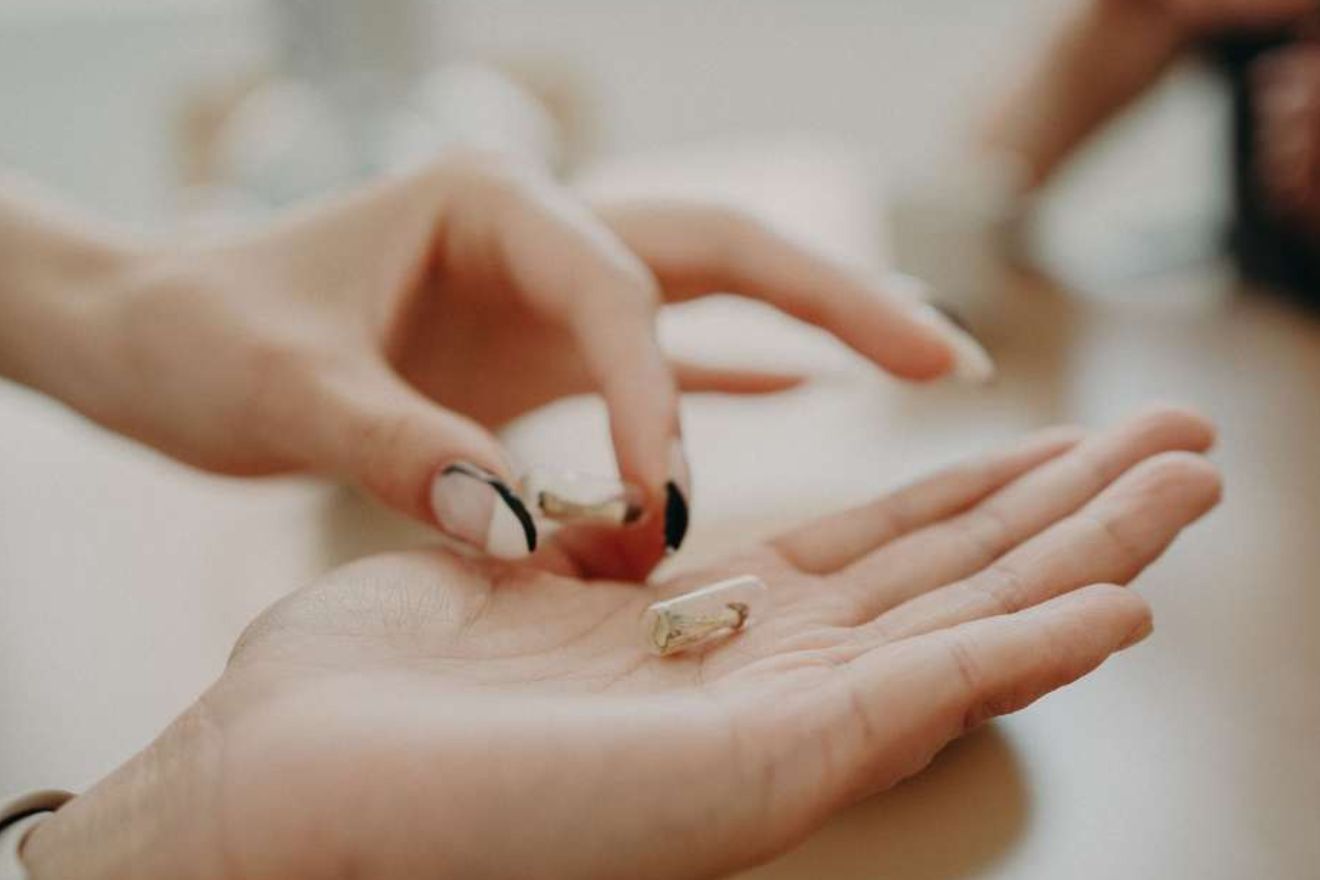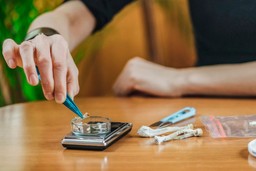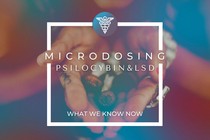The term ‘microdosing’ has grown substantially in popularity over the past few years. The most common classic psychedelic substances that are taken in microdoses are psilocybin and LSD.
Microdosing psychedelics involves ingesting between 5 and 10 percent of a standard dose which creates a sub-hallucinogenic effect. This means the person’s consciousness will not be altered in significant ways as microdosing does not include the “tripping” experience associated with psychedelic use.
To learn more about what microdosing is and how it works, check out this article.
From celebrities, social media, and Facebook posts to Reddit forums, many have shared personal anecdotes about how taking a very small dose of a classical psychedelic substance on a regular basis has eased their anxiety.
For instance, in a 2023 article published in The Washinton Post, Melissa Whippo, a therapist who specializes in psychedelics for perinatal mental health, details her experience working with moms and explains why some are microdosing mushrooms for their anxiety and depression.
She mentions the reasons why some of her patients have sought psychedelic therapy for their mental health.
“Many of them feel more comfortable taking something they feel is more “natural” such as psilocybin, which they don’t have to take daily, rather than a daily pill like Prozac, which is one in a class of drugs called a selective serotonin reuptake inhibitors (SSRI).”
She talks about one of her patients who struggled with severe anxiety after having her first child. Her patient constantly worried about her baby getting hurt and it negatively affected her sleep.
Psychotherapy helped her patient feel better but her worries about hurting her baby “didn’t fully vanish, which sometimes kept her suspended in fear”. Whippo shared that microdosing allowed her patient to feel “more uplifted and more grounded in her body”.
This article explores the research behind the claims and discusses some potential drawbacks.
Microdosing May Ease Anxiety Symptoms
A 2023 study investigated how microdosers make sense of microdosing psychedelics, focusing on the experience surrounding perceived mental health or well-being changes.
Through websites and online forums, 13 participants were included in the study. They were interviewed about their experiences of microdosing psychedelic substances. The transcripts were analyzed with Interpretive Phenomenological Analysis. The results generated three themes:
1. Seeking a solution: agency and rationale
Most of the participants except one mentioned that they were microdosing psychedelics because they wanted to help improve their lives. There were a few participants that specifically mentioned they were seeking support for their anxiety.
One participant named Evan talked about his social anxiety and his desire for treatment that wouldn’t affect his functioning:
“[I] had suffered from depression, ruminating thoughts, destructive thought patterns and social anxiety… I have either just dealt with it or used, primarily alcohol, to deal with them…I wanted something that wasn’t going to impair me”.
Mia shared that not being able to get timely treatment for her mental health conditions was a reason for microdosing:
“[I was] in a pretty dark place with depression, anxiety, and substance abuse and couldn’t get professional help from [services] fast enough so I guess that was my easy escape.”
2. Microdosers as scientists
Participants did not choose to microdose on a whim. It was important for them to carefully conduct their own scientific research on how it would affect them.
3. Catalyzing desirable and beneficial effects
Participants viewed microdosing not as a cure but as a tool or catalyst that supported their health improvement journey.
For instance, Mia talked about how microdosing helped her anxiety:
“I would love to credit it all to microdosing but I’m sure it’s also partly my own awareness …I don’t think I would’ve reached it on my own.”.
Kim shared how microdosing affected her social anxiety, boosted her self-esteem and the benefits rippled into her career:
“I have gained so much confidence it’s crazy. I have a new career lined up. I am sociable, I am happy to speak up for myself. I don’t even recognise the person that I was!… No social anxiety…For the first time ever”.
Learn more in our 2-hour online course.
The researchers concluded that participants reported positive effects with microdosing including benefits to their mental, social, physical, and cognitive health. However, future controlled studies with larger human samples need to be conducted to fully understand the effect of psychedelic microdosing.
A 2021 cross-sectional study compared the motivations, mental health and microdosing practices between a large international sample of self-selected adult microdosers and non-microdosers. Data was collected using a mobile application called Quantified Citizen (QC) which was downloaded from the site Microdose.me. The questionnaire included at most 123 questions. The Depression, Anxiety, Stress Scale-21 (DASS-21) was used to assess symptom severity over the past week.
The results showed that among participants who reported mental health concerns, microdosers had lower levels of anxiety, stress and depression than those who were non-microdosers. The results suggest that microdosing does not appear to increase acute negative effects even among those who report mental health concerns.
However, the researchers concluded that future controlled studies with longitudinal designs need to be conducted to explain the extent of mental health consequences of microdosing.
Microdosing May Cause Anxiety Symptoms
A 2023 home-administered randomized controlled trial looked at the effects of microdosing LSD in healthy male volunteers. The intervention and control groups received 14 doses of 10 μg LSD or an inactive placebo every 3 days for 6 weeks, respectively. Measures included results from daily questionnaires, expectancy, and pre- and post-intervention cognitive tasks and psychometrics.
The results of the daily questionnaires showed a significant improvement in energy, wellness, irritability, happiness, creativity and connectedness in the intervention group on dose days compared to non-dose days. Improvements were seen when controlled for preintervention expectancy.
However, the researchers highlighted an important adverse event that occurred which was treatment-related anxiety in the LSD group. The negative effect was alleviated through dose titration for some cases but it did not make a significant difference between groups. Treatment-related anxiety caused 4 participants in the intervention group to leave the study.
Follow your Curiosity
Sign up to receive our free psychedelic courses, 45 page eBook, and special offers delivered to your inbox.The study concluded that microdosing LSD appears to be generally safe for healthy adult men and may have acute mood-elevating effects. However, it may increase the risk of anxiety. The researchers suggest future microdosing trials be conducted using active placebos to control for placebo effects, low initial dose and responsive dose to adjust for variable drug responses between participants.
A 2019 study analyzed the content in an online Subreddit forum that included discussions about microdosing. It looked at the perceived benefits and limitations of microdosing and the results regarding anxiety appear to be contradictory.
Self-reported benefits included the following:
- Reduced depression and anxiety
- Enhanced cognition, creativity, self-insight and mindfulness
- Improved mood and attitude toward life
- Improved habits and health behaviors
- Improved social interactions and interpersonal connections
Perceived limitations included the following:
- Increased anxiety
- Issues with dosing
- Adverse physical effects
- Concerns about using illegal substances
- Unpleasant “off” days
- Only short-term improvements
- Limited or no improvement in mental health or cognition
- Concerns about dependence and drug-related risks
The researchers concluded that clinical randomized controlled research trials are required to investigate microdosing as a therapeutic treatment.
Microdosing May Have a Placebo Effect on Anxiety Symptoms
A 2022 cross-sectional mediation study explored psychedelic microdosing, anxiety and mindfulness. Online questionnaire data were collected from participants and the results were divided into three groups: current microdosers, former microdosers and non-microdosers which served as the controls. The State-Trait Anxiety Inventory — Trait subscale (STAI-T) and the 15-item Five-Facet Mindfulness Questionnaire (FFMQ-15) were used to assess trait anxiety and trait mindfulness respectively.
The results showed that current and former microdosers had significantly lower trait anxiety scores compared to the control group and the association was mediated by trait mindfulness.
However, when the data from participants with previous macrodose experience were removed from the analysis, there were no significant associations. Unlike microdosing, macrodosing can induce mystical experiences which have been shown to reduce anxiety and improve life satisfaction.
The study explained that perhaps participants had lower trait anxiety scores as a result of their previous macrodose experiences. The researchers also suggested that the placebo effect may be an explanation for the results.
Ultimately, the current research does not clearly explain whether microdosing can help relieve anxiety symptoms. The results appear to be limited, mixed and contradictory; some studies show a beneficial effect and others show it may lead to anxiety symptoms. In addition, the placebo effect may influence individuals to perceive improvements in their mental health.
More blinded and controlled studies are required to investigate whether microdosing is an effective medical treatment.
References
Hartong, V., & van Emmerik, A. (2022). Psychedelic Microdosing, Mindfulness, and Anxiety: A Cross-Sectional Mediation Study. Journal of Psychoactive Drugs, 1–11. https://doi.org/10.1080/02791072.2022.2080616
Lea, T., Amada, N., & Jungaberle, H. (2019). Psychedelic Microdosing: A Subreddit Analysis. Journal of Psychoactive Drugs, 52(2), 1–12. https://doi.org/10.1080/02791072.2019.1683260
Murphy, R. J., Sumner, R., Evans, W., Ponton, R., Ram, S., Godfrey, K., Forsyth, A., Cavadino, A., Krishnamurthy Naga, V., Smith, T., Hoeh, N. R., Menkes, D. B., & Muthukumaraswamy, S. (2023). Acute Mood-Elevating Properties of Microdosed Lysergic Acid Diethylamide in Healthy Volunteers: A Home-Administered Randomized Controlled Trial. Biological Psychiatry. https://doi.org/10.1016/j.biopsych.2023.03.013
Rootman, J. M., Kryskow, P., Harvey, K., Stamets, P., Santos-Brault, E., Kuypers, K. P. C., Polito, V., Bourzat, F., & Walsh, Z. (2021). Adults who microdose psychedelics report health related motivations and lower levels of anxiety and depression compared to non-microdosers. Scientific Reports, 11(1), 22479. https://doi.org/10.1038/s41598-021-01811-4
Ryan, R. S., Copello, A., & Fox, A. P. (2023). Experiences of microdosing psychedelics in an attempt to support wellbeing and mental health. BMC Psychiatry, 23(1). https://doi.org/10.1186/s12888-023-04628-9
Whippo, M. (2023, February 8). Advice | Some moms are microdosing mushrooms for anxiety and depression. Washington Post. https://www.washingtonpost.com/wellness/2023/02/08/microdosing-mushrooms-anxiety-depression-moms/








